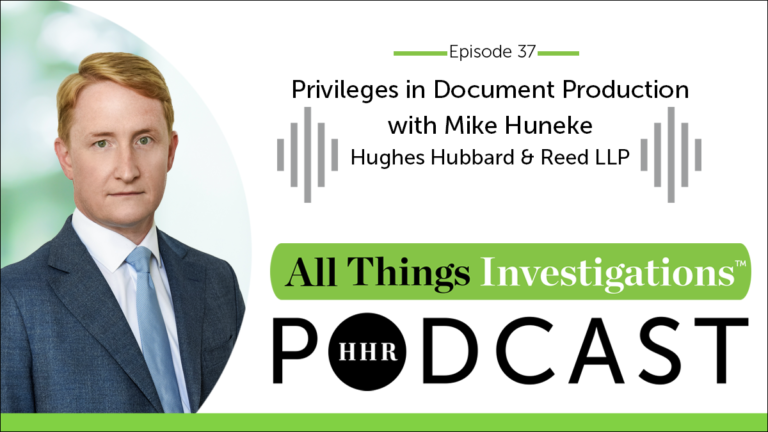In this episode of All Things Investigations, host Tom Fox and guest Mike Huneke explore a complex legal case involving Cognizant Technologies and former executives facing criminal charges for alleged bribery. The court’s ruling in this case has far-reaching implications for privilege disputes, document production, and cooperation with the government.
Mike Huneke is a partner in the firm’s Washington office. Among other things, Mike advises clients on the navigation and resolution of multi-jurisdictional criminal or Multilateral Development Bank (MDB) anti-corruption investigations. He assists companies subject to post-resolution monitorships or other commitments, and designs and executes risk-based strategies for due diligence on third parties.
You’ll hear Tom and Mike discuss:
- The Coburn and Schwartz Case is an ongoing document dispute that serves as a masterclass in federal criminal and civil procedure related to document production.
- The court categorizes documents into three categories, emphasizing their relevance to the criminal proceeding and repeatedly referencing Federal Rule of Criminal Procedure 17.
- The court addresses supporting documentation and investigative reports, considering waiver of privilege in relation to supporting evidence. It also highlights the need to defend the documents used in an investigation.
- Maintaining a wall between remedial activity and disclosures is crucial to prevent the remediation justification from surpassing disclosures.
- It is important to pause and carefully consider an investigation. While quickness and focus are essential, thoroughness should not be sacrificed. Keeping stakeholders informed is key.
- Privilege protects certain communications from being disclosed. Internal investigations can prevent disclosure of harmful information. Rule 17 requires disclosure of relevant documents, but privileged documents are exempt. Relevance must be demonstrated.
- Counsel who cooperate with the government face challenges in confidentiality, client protection, and legal issues. Balancing the defense of the investigation and its documents adds to the complexity.
- The court discusses concerns raised by the chief legal officer regarding the duration and fees of the investigation. It addresses the use of discussions between the CLO and the investigative team as evidence.
KEY QUOTES
“Talking about partial waivers. What does that mean? It means, well, waiving a little bit of a discussion, but not going for the whole discussion in a way that may be disadvantageous to the other party.” – Mike Huneke
“One common thread through all three categories, at least in the rulings from the magistrate judge or the recommended rulings from the magistrate judges to all three, was the importance of this being in a criminal proceeding. Time and again, the magistrate looks to Federal Rule of Criminal Procedure 17. And as that’s articulated, at least in the Third Circuit and in the District Court of New Jersey, even if there is a waiver, that doesn’t mean documents automatically have to be produced to the other party.” – Mike Huneke
“I think compliance professionals can rest assured that this is not an instance that will be cited back to them where they have to reveal all the nuts and bolts of how the program was designed, what choices were made about the scope of the program and how it was implemented or not.” – Mike Huneke
Resources
Hughes Hubbard & Reed website
Mike Huneke on LinkedIn






